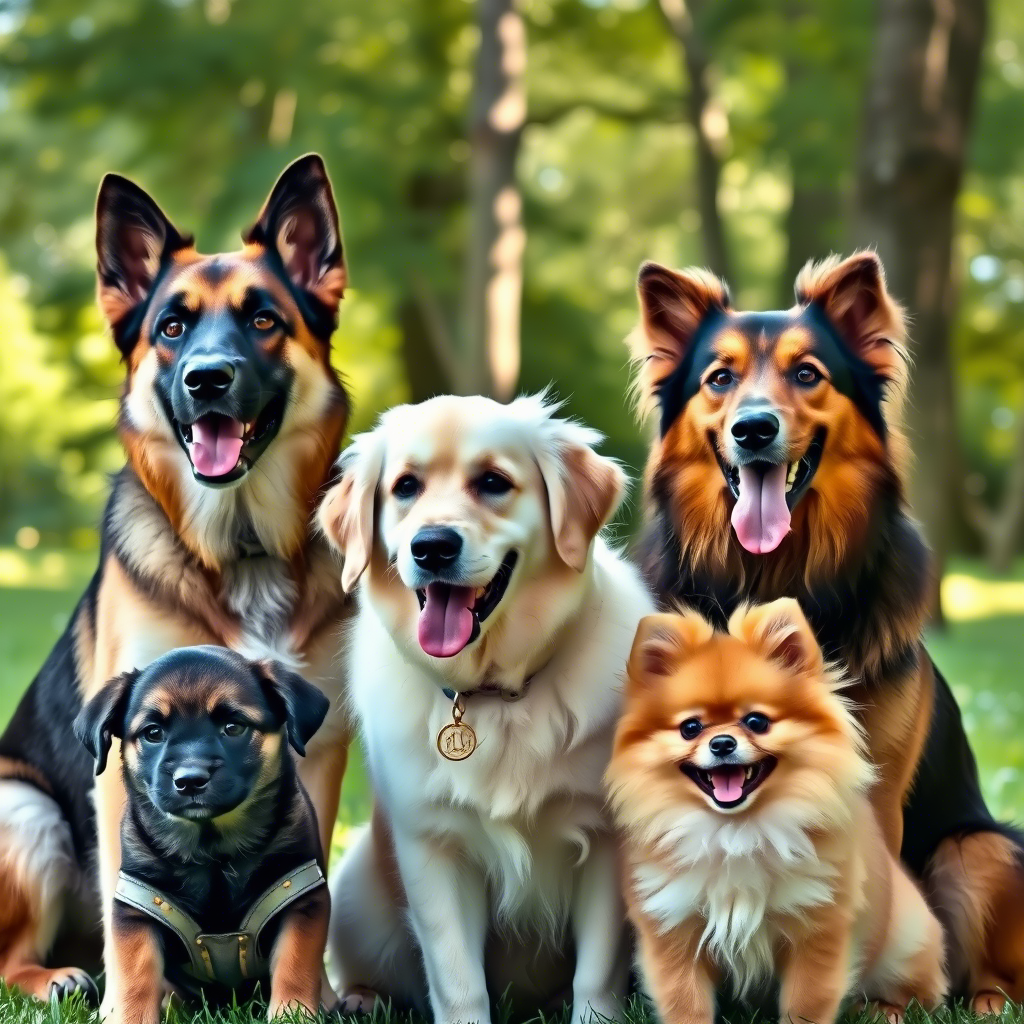Discovering the World of Dogs: A Comprehensive Guide to Different Types of Breeds
Dogs have been our loyal companions for thousands of years, and their diversity is nothing short of remarkable. From tiny lap dogs to towering working breeds, there’s a dog type suited for every lifestyle, personality, and purpose. Whether you’re considering adopting a furry friend or simply fascinated by canine variety, understanding the different types of dogs can help you appreciate their unique traits and roles in human society.
In this blog post, we’ll explore the various categories of dog breeds, delve into their characteristics, and provide insights into how these wonderful animals enrich our lives. Let’s embark on a journey through the world of dogs!

Why Are There So Many Types of Dogs?
The incredible range of dog breeds exists because humans have selectively bred dogs over centuries to perform specific tasks or fulfill particular needs. For example:
- Herding dogs were developed to manage livestock.
- Hunting dogs assisted with tracking and retrieving game.
- Guardian dogs protected homes and properties.
- Companion dogs became cherished family pets.
Today, organizations like the American Kennel Club (AKC) categorize dogs into groups based on their original purposes. These groupings make it easier to understand each breed’s strengths and suitability for certain environments.
The Major Categories of Dog Breeds
1. Herding Dogs
Herding dogs are intelligent, energetic, and highly trainable. Originally bred to control sheep, cattle, and other livestock, they excel at tasks requiring focus, agility, and quick decision-making.
Popular Herding Breeds:
- Border Collie : Known as one of the smartest dog breeds, Border Collies are tireless workers with an unmatched ability to learn commands.
- Australian Shepherd : Despite its name, this breed hails from the United States and thrives in active households.
- German Shepherd : Versatile and protective, German Shepherds often serve as police and military dogs but also make excellent family guardians.

2. Sporting Dogs
Sporting dogs are natural athletes, bred for hunting activities such as pointing, flushing, and retrieving birds. They are known for their friendly dispositions and high energy levels.
Popular Sporting Breeds:
- Labrador Retriever : America’s favorite breed for decades, Labs are affectionate, outgoing, and great with kids.
- Golden Retriever : Similar to Labradors, Golden Retrievers are gentle giants who love water and outdoor adventures.
- English Springer Spaniel : Energetic and eager to please, Springers are ideal companions for active families.
3. Working Dogs
Working dogs are powerful, intelligent, and dependable. Bred to assist humans in demanding jobs, they often serve as search-and-rescue dogs, sled pullers, or guard dogs.
Popular Working Breeds:
- Boxer : Playful yet protective, Boxers are excellent watchdogs and loving family members.
- Rottweiler : Confident and courageous, Rottweilers require proper training and socialization to thrive.
- Bernese Mountain Dog : Gentle giants with striking tri-color coats, Bernese Mountain Dogs are calm and devoted companions.
.
4. Hound Dogs
Hounds are renowned for their exceptional scent-tracking abilities and endurance. Divided into sighthounds (which chase prey using vision) and scenthounds (which rely on smell), these dogs are independent thinkers.
Popular Hound Breeds:
- Beagle : Small, curious, and merry, Beagles are beloved for their playful nature and keen sense of smell.
- Greyhound : Contrary to their racing reputation, Greyhounds are surprisingly lazy couch potatoes when not sprinting.
- Bloodhound : With unparalleled sniffing skills, Bloodhounds are frequently used in law enforcement.
.
5. Terrier Dogs
Terriers are feisty, spirited, and tenacious. Originally bred to hunt vermin, they retain a strong prey drive and a bold personality.
Popular Terrier Breeds:
- Jack Russell Terrier : Compact and lively, Jack Russells need plenty of exercise and mental stimulation.
- Bull Terrier : Recognizable by their egg-shaped heads, Bull Terriers are mischievous and clownish.
- Scottish Terrier : Dignified and independent, Scottish Terriers exude charm and elegance.
6. Toy Dogs
Toy dogs are small enough to fit comfortably in your lap, making them perfect for apartment living or individuals seeking a low-maintenance companion.
Popular Toy Breeds:
- Chihuahua : Tiny but mighty, Chihuahuas are fiercely loyal and full of personality.
- Pomeranian : Fluffy and fox-like, Pomeranians are alert and entertaining little companions.
- Shih Tzu : Affectionate and adaptable, Shih Tzus are known for their luxurious coats and sweet temperaments.
7. Non-Sporting Dogs
This diverse group doesn’t fit neatly into any other category. Non-sporting dogs come in all shapes, sizes, and personalities, offering something for everyone.
Popular Non-Sporting Breeds:
- Poodle : Available in standard, miniature, and toy sizes, Poodles are intelligent, hypoallergenic, and elegant.
- French Bulldog : With their bat-like ears and laid-back demeanor, Frenchies are wildly popular worldwide.
- Dalmatian : Famous for their spotted coats, Dalmatians are energetic and require ample exercise.
8. Mixed-Breed Dogs
While purebred dogs get most of the spotlight, mixed-breed dogs (often called mutts) deserve recognition too. These dogs combine traits from multiple breeds, resulting in unpredictable but delightful personalities.
Benefits of Mixed-Breed Dogs:
- Healthier Genetics : Crossbreeding reduces the risk of inherited health issues common in purebreds.
- Unique Appearance : Each mixed-breed dog is one-of-a-kind.
- Affordability : Adoption fees for mixed-breeds are typically lower than purchasing a purebred puppy.
How to Choose the Right Type of Dog for You
Selecting the right dog involves considering several factors, including:
- Lifestyle : Active individuals may prefer high-energy breeds like Border Collies, while sedentary folks might opt for calmer choices like Bulldogs.
- Living Space : Apartment dwellers should consider smaller breeds like Cavalier King Charles Spaniels, while larger homes suit bigger breeds like Great Danes.
- Time Commitment : Some breeds, like Huskies, demand significant attention and exercise, whereas others, like Basset Hounds, are more laid-back.
- Allergies : Hypoallergenic breeds like Bichon Frises or Portuguese Water Dogs shed less and produce fewer allergens.
- Budget : Factor in costs for food, grooming, vet care, and accessories when choosing a breed.
Conclusion: Celebrating Canine Diversity
Dogs bring joy, companionship, and unconditional love into our lives. Understanding the different types of dogs allows us to find the perfect match for our lifestyles and preferences. Whether you’re drawn to the athleticism of sporting dogs, the loyalty of working breeds, or the cuddliness of toy dogs, there’s a four-legged friend out there waiting to become part of your family.
Before bringing a dog home, remember to research thoroughly, visit shelters or reputable breeders, and prepare your home for their arrival. By doing so, you’ll ensure a happy, healthy relationship that lasts a lifetime.
Ready to meet your new best friend? Start exploring the wonderful world of dogs today—and don’t forget to share your story in the comments below!
3 Responses